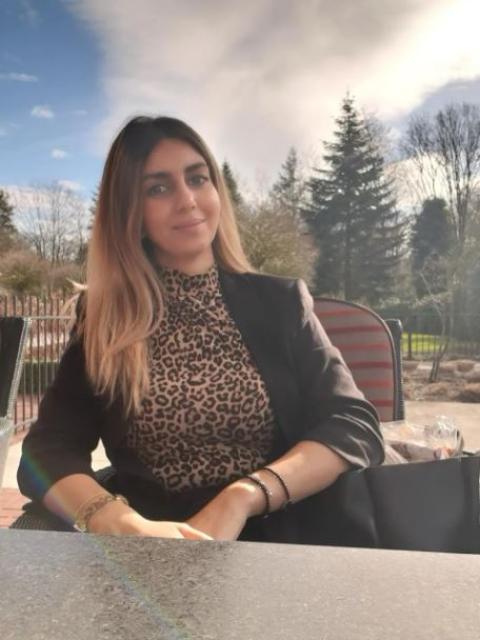
5 minute read
Battling Both War and Cancer: Mouna Nasr Journey of Resilience
From Syria to Iceland: A Tale of Survival and Hope
In the heart of wartorn Syria, amidst the chaos and devastation, Mouna Nasr discovered an inner strength that would guide her through one of the toughest battles of her life.
Diagnosed with breast cancer at the age of 30, Mouna faced the dual challenge of navigating a war zone and fighting a life - threatening illness. Today, she lives in Iceland, a symbol of resilience and hope, sharing her story to inspire others.
Mouna Nasr, a resilient SyrianVenezuelan woman, now calls Iceland her home. Her journey, marked by fleeing wartorn Syria, surviving breast cancer, and building a new life in Europe, is nothing short of inspirational.
As a pharmacist, Mouna worked with the Red Cross in Syria, focusing on child and pregnant nutrition. It was during this work, while educating mothers about breastfeeding and breast cancer prevention, that she discovered a lump in her own breast. At 30 years old, she was diagnosed with aggressive, hormonal breast cancer. This marked the beginning of her fight for survival.Mouna Nasr, a resilient SyrianVenezuelan woman, now calls Iceland her home. Her journey, marked by fleeing wartorn Syria, surviving breast cancer, and building a new life in Europe, is nothing short of inspirational.
Enduring Cancer Treatment in a War Zone
In October 2017, Mouna was working as both a pharmacist and nutritionist in a UNHCR and Red Crescent project. The project aimed to ensure that all pregnant women, girls, and children aged five months to six years received proper nutrition and supplements. ”The project was about giving supplements to areas lacking nutrition,” Mouna recalls. While educating women on the benefits of breastfeeding and its potential to reduce breast cancer risk, she felt a lump in her own breast. ”It was a shock,” she says. ”I knew something was wrong and went to the doctors.”
A biopsy confirmed her fears: a 0.5 cm tumor. Thus began her battle with breast cancer, an aggressive hormonal type, requiring immediate surgery and chemotherapy and radiotherapy. The treatment was grueling, made worse by the constant threat of bombings in Damascus.
”I was afraid of dying, not knowing if it would be from cancer or a bomb,” Mouna remembers.
”Sometimes it was safer to travel by bus to the hospital, despite feeling terribly sick from chemo, to avoid kidnapping and other war problems, as well as the lack of benzine for my car.”

The Cost of Survival
Mouna’s journey through cancer treatment was fraught with difficulties. ”Damascus was really unsafe, and the hospital had been bombed multiple times,” she says. ”I had to pay for my imported chemo, and a chair where I could sit and get my treatment. If I hadn’t had money, I wouldn’t have been treated.” She speaks of the widespread use of fake medicine, often just water, which made reliable treatment even harder to obtain.
Her husband, a doctor, had fled to Venezuela to avoid being drafted into the army. Mouna was left to face the bombings and treatment alone, with only her young daughter and help from her family.
A New Beginning in the Netherlands
Mouna made the difficult decision to leave Syria. ”I couldn’t live there anymore, due to my health and the constant danger,” she explains. With a Venezuelan passport, she was able to move to the Netherlands in search of a safer life for herself and her daughter.
Life in the Netherlands brought new challenges. ”It took six months to get into the healthcare system,” Mouna says. ”But I found a cancer support organization that helped me a lot.”
These support groups provided her with muchneeded emotional support and helped her navigate the complexities of her ongoing cancer treatment and after her second surgery in the Netherlands.
Finding Stability in Iceland
In 2022, Mouna moved to Iceland to reunite with her husband, who had sought asylum here. The transition was challenging, especially for her daughter, but things gradually improved. ”We are together, and that is the main thing,” Mouna says with a smile.
Iceland's healthcare system provided Mouna with new hope. ”My doctor, Óskar, has been amazing. He explained that the treatment I received in Syria was limited, and he has tried another kind of treatment that he believes is better for me, as a young adult diagnosed with breast cancer,” she says. Mouna has also become involved in Kraftur, a support organization for cancer patients in Iceland, finding solace in their events and activities. Mouna is on the waiting list for her third surgery in Iceland as well.

A Message of Hope
Today, Mouna works at Landspítali pharmacy. But she and her husband, a gynecologist, both still face challenges due to their nonEEA background. They have neither received recognition for their education and experience in their field, but remain hopeful. ”I want a stable life here in Iceland.”
Mouna’s story is a testament to the power of resilience and hope. She now is a vice chair at W.O.M.E.N. in Iceland, a network of women of multicultural ethnicity. ”There is always hope,” Mouna says. ”With hope, you can survive.”
Through her story, Mouna encourages everyone, especially foreign women in Iceland, to seek cancer screening and support. ”Kraftur is there for you,” she says. ”Remember, with hope, and the power of a positive mindset you can survive.”
”We are all stronger than we think.”
Kraftur is an organization that supports young adults diagnosed with cancer from the age of 18 to 40 years old and relatives from 18 years old. You can get various support at Kraftur, such as financial support, consultation, peer support, coaching etc.



